By Seowon Song
In my opinion, I am a quite ordinary university student in South Korea. However, there is a feature that has made my life unusual: my older brother. He is two years older than me, and has autism. This may sound strange, but at least in South Korea, living as a sibling of an autistic person is considerably different from others.

photo of Seowon Song
" data-orig-size="4032,3024" sizes="(max-width: 400px) 100vw, 400px" data-image-title="asf-songseowon" data-orig-file="https://autismsciencefoundation.files.wordpress.com/2018/06/asf-songseowon.jpeg?w=400&h;=300" data-image-meta="{"aperture":"2.2","credit":"","camera":"iPhone 6s Plus","caption":"","created_timestamp":"1528715867","copyright":"","focal_length":"4.15","iso":"64","shutter_speed":"0.066666666666667","title":"","orientation":"1"}" width="400" data-medium-file="https://autismsciencefoundation.files.wordpress.com/2018/06/asf-songseowon.jpeg?w=400&h;=300?w=300" data-permalink="https://autismsciencefoundation.wordpress.com/2018/06/11/from-being-alone-to-being-together-formed-the-first-sibling-supporting-group-in-south-korea/asf-songseowon/" alt="Seowon Song" height="300" srcset="https://autismsciencefoundation.files.wordpress.com/2018/06/asf-songseowon.jpeg?w=400&h;=300 400w, https://autismsciencefoundation.files.wordpress.com/2018/06/asf-songseowon.jpeg?w=800&h;=600 800w, https://autismsciencefoundation.files.wordpress.com/2018/06/asf-songseowon.jpeg?w=150&h;=113 150w, https://autismsciencefoundation.files.wordpress.com/2018/06/asf-songseowon.jpeg?w=300&h;=225 300w, https://autismsciencefoundation.files.wordpress.com/2018/06/asf-songseowon.jpeg?w=768&h;=576 768w" class="alignnone wp-image-3422" data-large-file="https://autismsciencefoundation.files.wordpress.com/2018/06/asf-songseowon.jpeg?w=400&h;=300?w=500" />Seowon Song
A summer day of July 2009, I had a chance to participate a summer camp held by Autism Society Korea (ASK). In the camp, there were many families of children with special needs, and the programs were divided into three parts; for the children, for the parents, and for the siblings. That was the first time for me to meet other children who had had similar experience being siblings without disabilities. Some of them seemed to be unfamiliar with talking about their family members, especially their brothers and sisters. I was the oldest among them, so I shared my story and tried to make them feel free to talk about their experience. When I listened to them and expressed my empathy, a little boy hesitated for a moment and asked me a question.
“How can you understand me that well?”
That was the first moment that I realized the necessity of supporting groups for siblings where they could share their experience and empathize with among them. Also, I made my mind to make a sibling supporting group in South Korea someday.
In the beginning of January 2016, I met four other siblings my age of people with disability. On the first day we met, we even lost track of time talking about our lives and realized that we had quite a few things in common. Even though our siblings with special needs had different symptoms and aspects in detail, we had similar experience, concerns, and thoughts. When we were children, we had felt left out in our families or from our parents, and even felt ignored by them. There were a lot of things that we couldn’t understand about our brothers and sisters, but there was almost no one whom we could ask. Some of us used to feel resentment toward our siblings themselves, the disabilities of our siblings, and parents, which led us to feel guilty about the anger. Some people, including me, had a tendency to strongly desire to be acknowledged and used to tried hard to exceed expectations from others to be loved. Talking about our lives, we decided to form the first sibling supporting group in South Korea, and named it as “Nanun,” which means “It’s about me.”
From the beginning, we have had dozens of meetings with other siblings. In the meetings, they felt free to talk about their brothers and sisters, parents, and especially themselves. Having gathered diverse episodes from those meetings, finally, we published a book containing our stories on March 2018. Not only did we get a success in the publication, but we also achieve a lot of things in “Nanun.” Firstly, there is a lack of attention to people with disabilities in South Korea, so it’s hard to expect concerns for their family members, especially the siblings. We made it possible for people to realize the existence of siblings of people with special needs. Additionally, for the first time in our lives, we had a chance to be more concerned with ourselves, not the brothers and sisters or parents. We tried to concentrate on ourselves, face and admit the various emotions. It helped us to relieve our anxiety or alienation as siblings without disabilities.
But the most important thing that we fulfilled was to recognize that we are not alone. In my case, I had felt alone and strange because I had thought that I might be the only one who had anger, fears, and guilt being a sister of an autistic person. I was afraid that there might be no one that understand me and empathize with me. However, forming the supporting group and meeting siblings, I finally realized that I was not the only one. Also, I am not the only one who does not feel alone anymore. Standing with many other siblings, we understand the power of being together and make a next step to be mature.
Advertisements